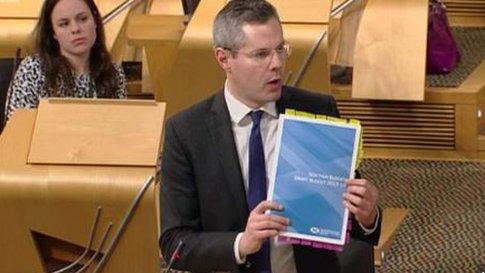FMQs: From solemn start to rowdy end
- Published
Ken Macintosh: "I'm not expecting reverential silence, but......"
Discourse in parliament is frequently somewhat frenzied. Angry, impatient, combative. Full of sound and fury, some of it genuine.
Then, again, parliament can be, when required, solemn, sombre and engaged. I applaud both modes: they have their place. Both were on display at Holyrood today.
Firstly, the sombre note. For the Tories, Ruth Davidson raised the subject of John Leathem, the shop owner who murdered the schoolgirl, Paige Doherty.
He stabbed her 61 times but, according to his lawyers, had shown genuine remorse. His minimum term in prison was reduced from 27 years to 23. Paige's family said there were no words to describe their feelings.
Ruth Davidson found words on their behalf today. She roundly criticised the decision and argued, further, that it merited examination as part of a review of sentencing guidelines and practice.
The First Minister's response was instructive. She could, of course, have opted to duck the question, falling back on the argument that the independence of the judiciary must be defended and protected.
That, she implied, would be the mode Ministerial when dealing with such matters. To be clear, the FM did indeed stress the vital importance of independent courts.
But there was more. Ms Sturgeon added that she was a human being in addition to heading the Scottish government.
In that human role, she contrived to leave the chamber in no doubt that she disagreed profoundly with the judicial verdict. Ms Davidson nodded supportively.

John Leathem was originally jailed for a minimum of 27 years for murdering Paige Doherty, but had that term reduced by four years after an appeal

For Nicola Sturgeon, FMQs started gently but it did not finish that way
The Tory leader went further. She argued that whole life sentences should be made available to courts by statute. That judges should, she argued, be able to confine a prisoner for the entirety of their natural life. She indicated the Tories were prepared to bring forward a Member's Bill to this effect.
Ms Sturgeon did not dissent - but she did not entirely agree either. She reminded Ms Davidson that the availability of such a sentence did not mean it would be applied by judges in individual cases. Public and political outrage might still ensue from time to time.
Rather, said the FM, sentencing guidelines should be kept under constant review, "calmly and rationally". Two descriptions which would equally apply to this excellent discussion.
Chuntering not allowed
To the other side, now. The rough and rowdy. On a number of occasions today, the Presiding Officer, Ken Macintosh, was obliged to intervene to urge peace.
He did not, he said, expect "a reverential silence". (For some unaccountable reason, I was instantly reminded of the Reverend I.M. Jolly, Rikki Fulton's brilliant portrayal - with his low, gloomy voice and his long pauses. Comedy genius.)
OK, I'm back in the room. To reprise, the PO conceded that a little banter was to be expected. But he did not want MSPs "chuntering". Well, quite.
Anyway, it seemed that the chunter count was rather too high for the PO today. Up with it he would not put.
And did our elected tribunes cease their endless chuntering? Not so you would notice. Although perhaps they allowed longer gaps between their murmurs of discontent.
Certainly, there were competing choruses, comprising SNP and Labour backbenchers, during the rather sharp exchanges between Ms Sturgeon and Kezia Dugdale.
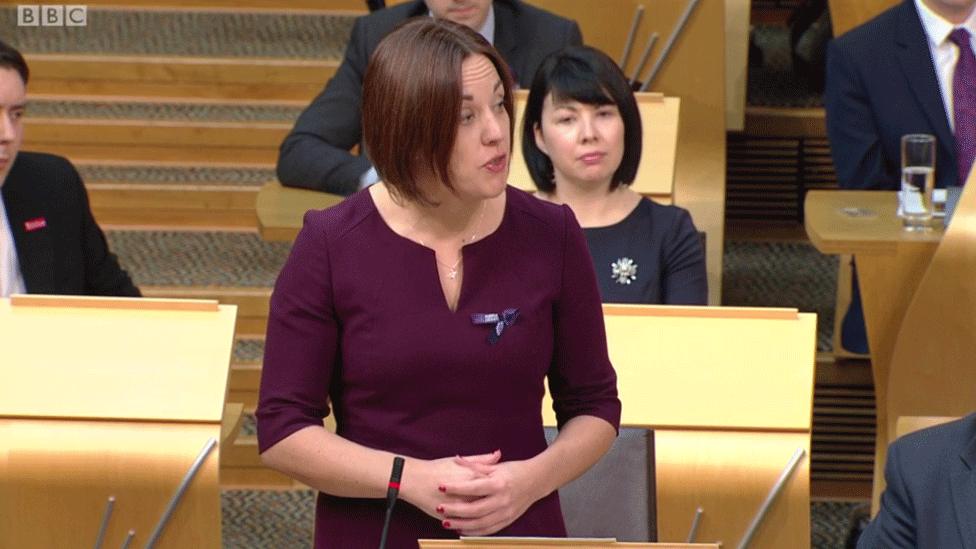
Health service matters were highlighted by Labour's Kezia Dugdale
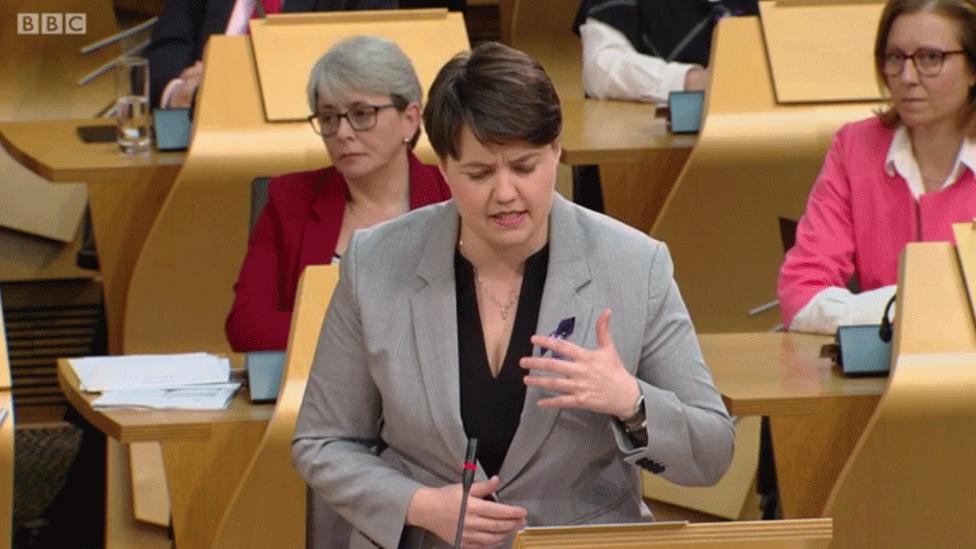
All of Scottish Tory leader Ruth Davidson's questions focused on the Paige Doherty case
The Labour leader returned to a familiar theme, the provision of health care at the Royal Alexandra Hospital in Renfrewshire. In particular, she raised the proposed closure of the hospital's children's ward.
Had the FM misled voters when she said during the Holyrood election last year that there were no proposals to close the ward? (Cue strident Labour yells.)
Ms Sturgeon insisted she had not. At the time the promise was made, there were no such proposals. Now they had emerged and were sufficiently substantial to merit being called in for a Ministerial decision.
The same process, Ms Sturgeon recalled, which previously resulted in the rescue of A&E units in Monklands and Ayr. Like the RAH for Ms Dugdale, those units are a constant them for the FM. (Cue SNP barracking of their Labour rivals.)
The row escalated, as these things do. Ms Dugdale complained that intensive care cots were being removed from neonatal units. Ms Sturgeon retorted that the changes to neonatal care were following expert medical guidance. Her opponent's accusations were "absolutely and utterly disgraceful".
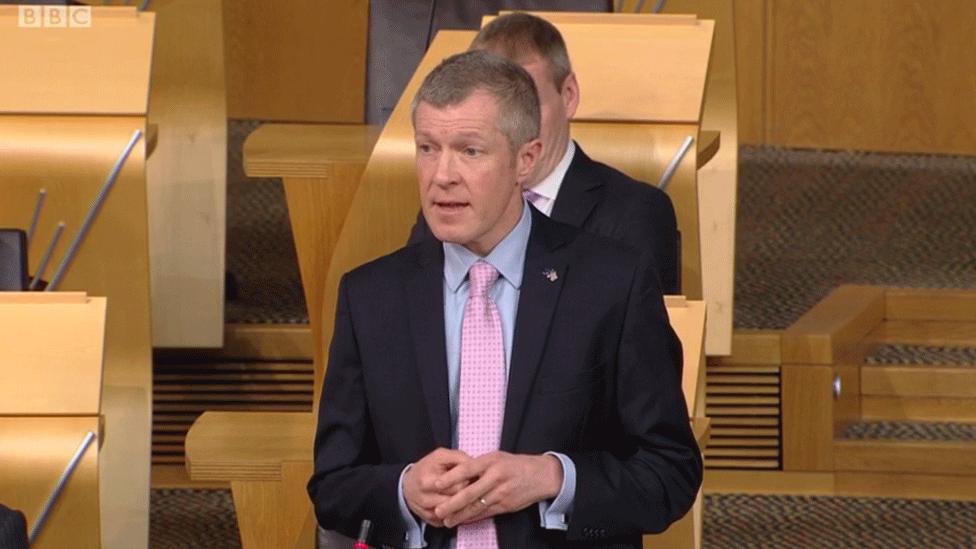
Scotland's police numbers were the concern of Scottish Lib Dem leader Willie Rennie
Then it was Willie Rennie's turn. He pursued the topic of police services. As he has done many times previously. In a rather effective fashion, to be fair. Would the SNP sustain their policy towards police numbers, which involved an extra 1000 bobbies on the beat?
Ms Sturgeon gave a lengthy answer which praised the police and vaunted their numbers over a decade - while also noting that cybercrime and such matters perhaps merited the consideration of an alternative approach, with the deployment of experts.
Mr Rennie listened carefully - and decided to translate the reply. He reckoned that the concise answer to his question as to whether police numbers would be maintained was: "No."
The FM dissented. If and when there was a policy decision, it would be announced and explained to parliament. Whether in sombre or rowdy mode.
- Published23 February 2017
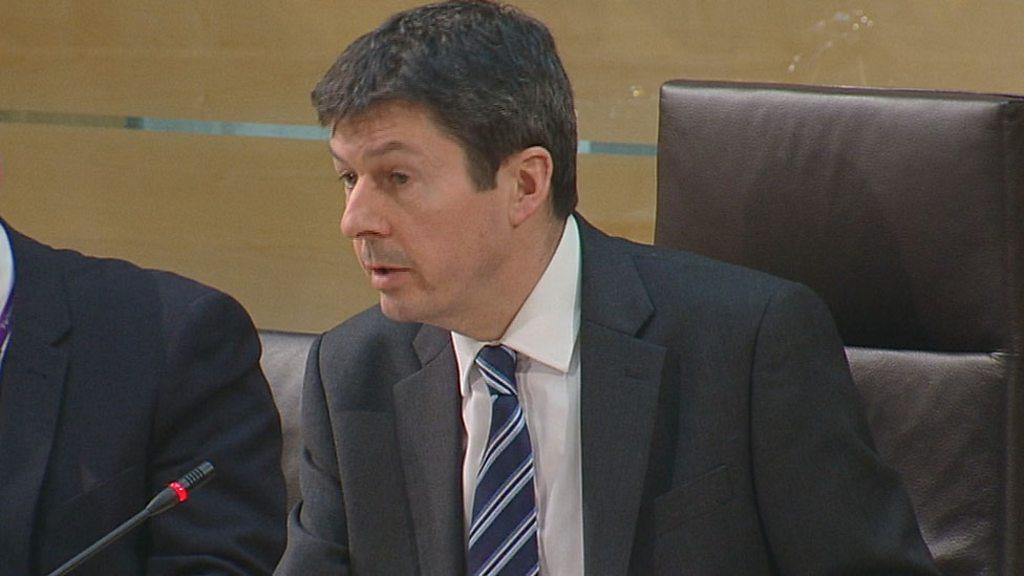
- Published23 February 2017

- Published20 February 2017
